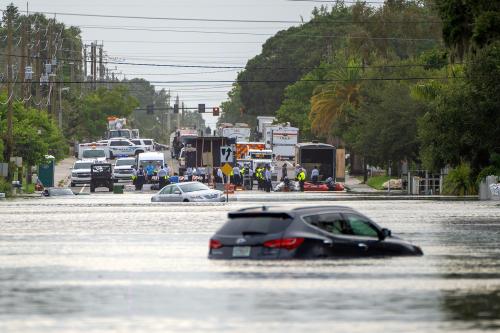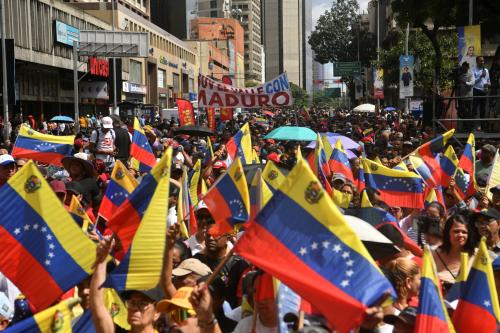When Hurricane Katrina made landfall on August 29, 2005, and the federal levees protecting metropolitan New Orleans failed, it marked one of the most devastating disasters in U.S. history. Less than a month later, Hurricane Rita slammed ashore on September 24, 2005, adding to the already catastrophic impacts felt across the Gulf Coast region. From Hurricane Katrina alone, more than 900 Louisiana residents were killed, some 500,000 homes were damaged, and more than a million people were displaced.1
Regionally, total damages were estimated at $151 billion.2 Approximately $75 billion of the $120.5 billion administered in federal aid focused on immediate emergency efforts, alongside contributions of $6.5 billion in philanthropic support.3 The scope and scale of the disasters, exacerbated by infrastructure vulnerabilities, the destruction of community networks, and the exposure of deeply entrenched inequities that had long been felt throughout the New Orleans metropolitan area, prompted what would become one of most notable philanthropic responses ever witnessed.
New Orleans’ philanthropic and nonprofit ecosystem after Hurricane Katrina has been dynamic, fraught with tensions, characterized by innovation, and marked by both remarkable successes and persistent challenges. The initial emergency response transitioned to long-term recovery and rebuilding efforts, which in turn evolved into transformational initiatives that sought to address the root causes of vulnerabilities while restoring the treasured vibrancy of the city and region that had been so tragically upended.
This report examines these complex dynamics through multiple lenses, and in doing so, seeks to quantify the scale and distribution of philanthropic investment, explore the tensions between external and local priorities, and investigate the factors that have influenced the long-term sustainability of nonprofit efforts. This retrospective analysis serves multiple purposes: documenting a significant chapter in American philanthropy, exploring the benefits and challenges of philanthropic support after Hurricane Katrina and Hurricane Rita, and informing future strategies for building genuine community resilience.
The discussion is informed by the perspectives and expertise of community leaders who regularly engage with the philanthropic community, nonprofits, advocates, and individual philanthropists. Eleven such interviews were conducted from April to July 2025, with local and national leaders reflecting experiences ranging from the immediate response efforts to present-day initiatives.4
While acknowledging that a holistic view of philanthropy is inclusive of volunteerism, skilled expertise, advocacy, and engagement beyond financial donations, this analysis focuses on monetary contributions from philanthropic foundations to charitable organizations classified as tax-exempt under Internal Revenue Code 501(c)(3).5 By analyzing how the sector navigated changes in service capacity, leadership, workforce composition, resource allocation, and policy environments, this analysis aims to contribute a nuanced understanding of philanthropy’s role in shaping metropolitan New Orleans over the past 20 years since Hurricane Katrina.
Central to this analysis is the recognition that philanthropy does not operate in isolation. Its effectiveness and potential are influenced by government policies, market forces, community leadership, cultural contexts, and historical patterns of development. In New Orleans, these factors include deep racial disparities; complex political dynamics at the local, regional, and state level; unique cultural assets; environmental vulnerabilities; and economic challenges that both preceded and followed Hurricane Katrina.6
This discussion holds great value with regards to regional resilience, because the function of 501(c)(3) public charities is to provide programs and services in the interest of the public good as nonpartisan organizations. With work in areas including human services, education, arts and culture, economic development, health, and many other areas that impact social well-being, nonprofits and philanthropy are viewed as trusted partners and advocates in addressing community needs.7
Central to this credibility is the ability of nonprofit groups and philanthropic organizations to establish strong relationships with the people most directly affected by the issues they work to address.8 A 2024 report on trust in nonprofits and philanthropy from the Independent Sector and Edelman Data and Intelligence notes that on a national scale, trust in nonprofits increased by 5 points, to 57 percent, from 2023 to 2024, while trust in philanthropy remained relatively steady at 33 percent over the same period. These levels of trust stand in contrast to other sectors such as government, business, and media—all of which declined from 2023 to 2024.9
As policymakers and community leaders look to address contemporary challenges while shaping future possibilities, this report offers insights into how philanthropic resources might more effectively support nonprofit organizations in serving the public good, meeting the needs of those most directly affected by persistent issues, and advance progress toward a more resilient and prosperous New Orleans. Specifically, the report suggests that based on the lessons learned over the past 20 years, philanthropic investment should focus on:
- Integrating community knowledge and professional expertise
- Investing early in coordination infrastructure
- Balancing structure and flexibility
- Supporting operational capacity
By presenting these lessons learned and offering these insights, this report contributes to broader conversations about the ever-evolving role of philanthropy in advancing society.
Read more
This report is part of a series from Brookings Metro and The Data Center examining the New Orleans metro area across key policy areas including housing, community safety, and flood adaptation. The series provides local leaders with tools to mitigate future disaster risks for the most vulnerable communities.
-
Footnotes
- Allison Plyer, “Facts for Features: Katrina Impact,” The Data Center, August 26, 2016. Available at: https://www.datacenterresearch.org/data-resources/katrina/facts-for-impact/#:~:text=Deaths.,over%20the%20age%20of%2074.
- Allison Plyer, Nihal Shrinath, and Vicki Mack, “Executive Summary, The New Orleans Index at Ten,” The Data Center, July 31, 2015. Available at: https://www.datacenterresearch.org/reports_analysis/new-orleans-index-at-ten/.
- Allison Plyer, “Facts for Features: Katrina Impact,” The Data Center, August 26, 2016. Available at: https://www.datacenterresearch.org/data-resources/katrina/facts-for-impact/#:~:text=Deaths.,over%20the%20age%20of%2074.
- Author interview communications (in chronological order): Charmel Gaulden, chief executive officer and president at Foundation for Louisiana, April 2, 2025 Christine Briede, executive director, Jefferson Community Foundation, April 3, 2025 Michael Fitts, president of Tulane University, April 8, 2025 Linetta Gilbert, managing partner at Gilbert & Associates, LLC. April 8, 2025 Christy Wallace Slater, founder and chief executive officer of Slater Consulting Group. April 21, 2025 Stephanie Barksdale, New Orleans social innovation leader and certified leadership and resilience coach, Sparking Insights LLC, April 23, 2025 Flozell Daniels, Jr., chief executive officer of the Mary Reynolds, Babcock Foundation, April 25, 2025 Jilla Tombar, Blackbridge Philanthropic, April 28, 2025 Ryan Albright, Tulane University adjunct lecturer and evaluation lead, Louisiana Department of Health, June 12, 2025 Akilah Wallace, founder and principal consultant, Taylor Wallace – A Social Impact Consultancy, June 12, 2025 Kimberly O’Neil, founder and chief executive officer, Giving Blueprint, June 7, 2025 Alicia Oliver, managing director of the Greater New Orleans Funders Network, July 8, 2025
- Internal Revenue Service, Exempt organization types. Last accessed July 17, 2025. Available at: https://www.irs.gov/charities-non-profits/exempt-organization-types.
- Allison Plyer, Nihal Shrinath, and Vicki Mack, “Executive Summary, The New Orleans Index at Ten,” The Data Center, July 31, 2015. Available at: https://www.datacenterresearch.org/reports_analysis/new-orleans-index-at-ten/.
- Aleda Gagarin and Cathleen Clerkin, “Why the social sector is vital to healthy, thriving communities,” Candid, February 13, 2025. Available at: https://blog.candid.org/post/what-are-ngos-public-charities-nonprofit-work-funding/.
- Akilah Watkins, “Community relationships strengthen public trust in nonprofits, Candid, September 16, 2024. Available at: https://blog.candid.org/post/public-trust-in-nonprofits-takes-strong-community-relationships/.
- Independent Sector and Edelman Data and Intelligence, Trust in Nonprofits and Philanthropy: Strengths and Challenges in a Time of Division, June 2024. Available at: https://independentsector.org/resource/trust-in-civil-society/?gad_source=1&gad_campaignid=21422542079&gbraid=0AAAAAolQ-ukKbrjq5FzWZwucMn5ZyaYjK&gclid=CjwKCAjwy7HEBhBJEiwA5hQNok7Nh7-wG48DfLiCzO-U0B4p9orkryG2uxyYrABS-hORUGqZrlbDvRoCA3EQAvD_BwE.
The Brookings Institution is committed to quality, independence, and impact.
We are supported by a diverse array of funders. In line with our values and policies, each Brookings publication represents the sole views of its author(s).




